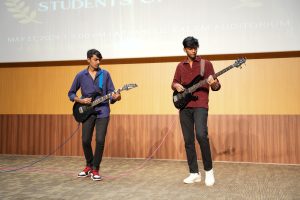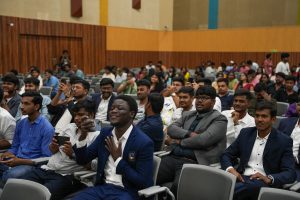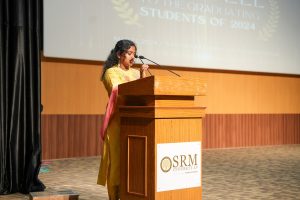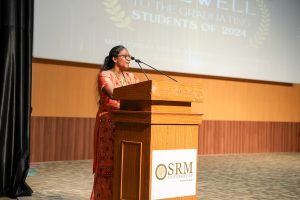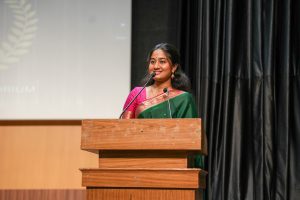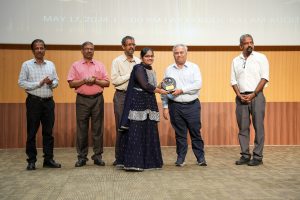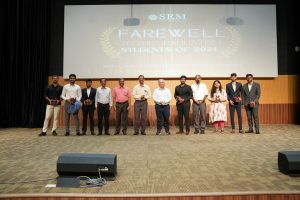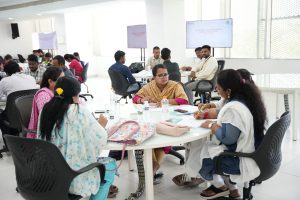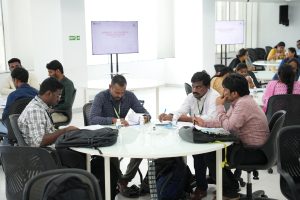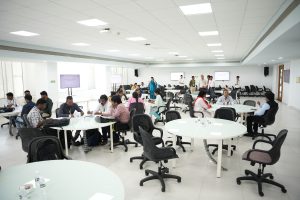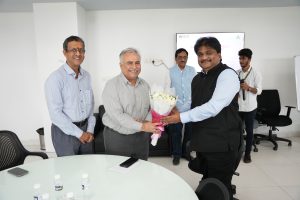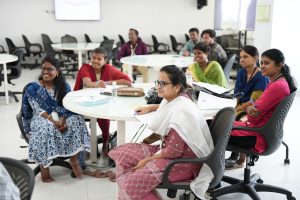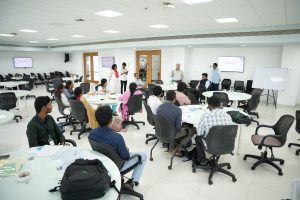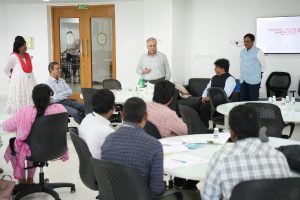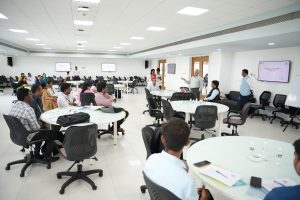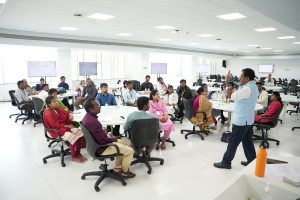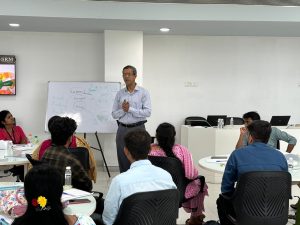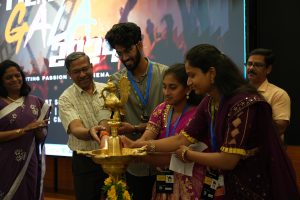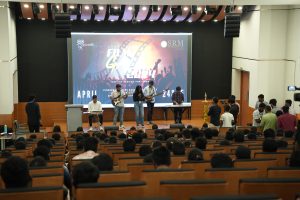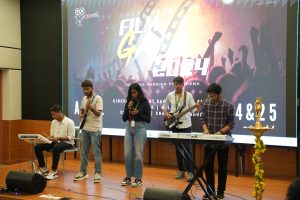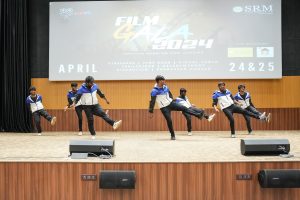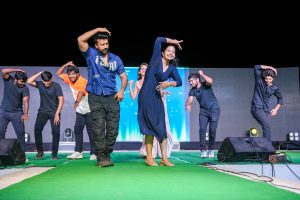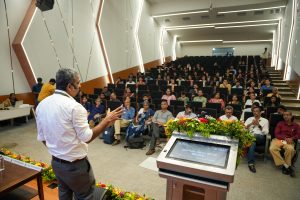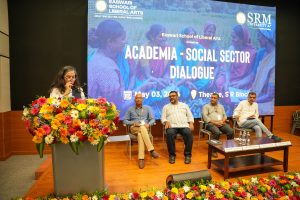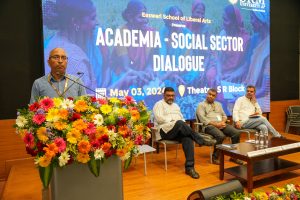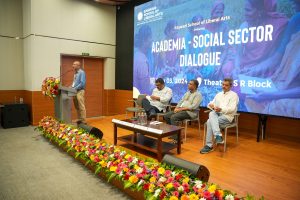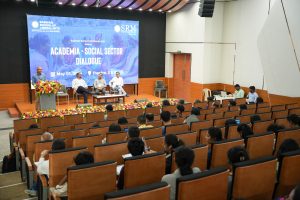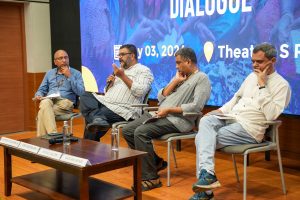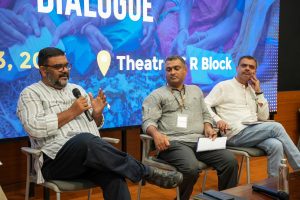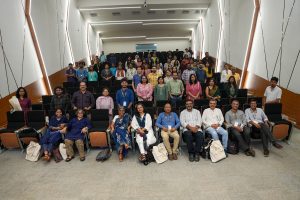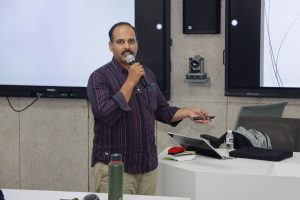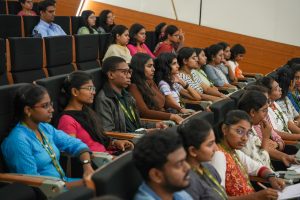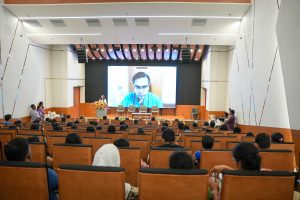Innovative Insights: Rupesh Kumar’s Book Unveils Advances in Wireless Technologies
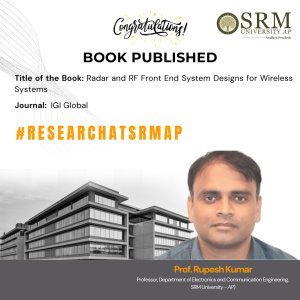 In a remarkable stride for the field of wireless communication, Prof. Rupesh Kumar from the Department of Electronics and Communication Engineering has authored a pivotal book that promises to redefine our understanding of radar and RF systems. The book, entitled “Radar and RF Front End System Designs for Wireless Systems,” is the latest gem in the prestigious “Advances in Wireless Technologies and Telecommunication (AWTT)” series.
In a remarkable stride for the field of wireless communication, Prof. Rupesh Kumar from the Department of Electronics and Communication Engineering has authored a pivotal book that promises to redefine our understanding of radar and RF systems. The book, entitled “Radar and RF Front End System Designs for Wireless Systems,” is the latest gem in the prestigious “Advances in Wireless Technologies and Telecommunication (AWTT)” series.
With his profound expertise, Prof. Kumar navigates through the complexities of designing state-of-the-art front-end systems, offering readers a treasure trove of knowledge that bridges theory and practical application. This book is set to become an essential read for aspiring engineers and seasoned professionals alike, enriching the academic and industry landscape with its innovative approach.
Join us in celebrating Prof. Kumar’s exceptional contribution to the world of electronics and communication engineering. Dive into the depths of this masterful work and emerge with insights that could shape the future of wireless systems.
About the Book:
Radar and RF Front End System Designs for Wireless Systems delves into the intricate world of wireless technologies, particularly focusing on radar and RF front-end systems. The advent of wireless communication has ushered in a new era of connectivity, revolutionising various sectors including healthcare, smart IoT systems, and sensing applications. In this context, the role of RF front-end systems, with their reconfigurable capabilities, has become increasingly vital. The impetus behind this book stems from the remarkable surge in innovation witnessed in RF front-end systems. Researchers and practitioners alike have contributed a plethora of new configurations and design architectures, paving the way for unprecedented advancements in wireless systems. Our aim with this publication is to provide a platform for researchers to explore both theoretical insights and practical applications, thereby facilitating the dissemination of the latest trends and developments in the field. The contents of this book cover a wide spectrum of topics, ranging from RF frontend antenna systems to the impact of artificial intelligence and machine learning in system design. With contributions from experts in academia and industry, readers can expect a comprehensive exploration of radar and antenna system design, modeling, and measurement techniques. We envision this book serving as a valuable resource for students, researchers, scientists, and industry professionals seeking to deepen their understanding of RF front-end antenna and radar system designs. Whether it’s exploring reconfigurable antenna systems for 5G/6G networks, or delving into radar modelling and signal processing techniques, this book offers insights that are both timely and relevant.
Co-author of the Book:
Shilpa Mehta, a co-author of the book, holds a PhD from Auckland University of Technology, New Zealand. Presently, she serves as a Teaching Assistant at AUT, Auckland. Shilpa received the Summer Doctoral Research Scholarship for her PhD work. Her research spans across projects such as Radio Frequency Integrated Circuits, RF front ends, Optimization, Internet of Things, Wireless Communication, Artificial Intelligence, Healthcare, Radars, Software-defined Radios, and Smart Cities.
For the Book Chapter Publication, Click the Link
- Published in Departmental News, ECE NEWS, News, Research News
Faculties Publish an Insightful Article on Political Manifestos and Labor Class
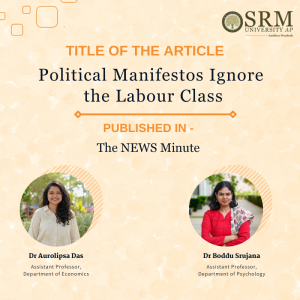 In a thought-provoking article titled “Political Manifestos Ignore the Labor Class,” Dr Aurolipsa Das and Dr Srujana Boddu, Assistant Professors from the Department of Economics, shed light on a critical issue that often goes unnoticed during election seasons. Their research delves into the disconnect between political promises and the ground realities faced by the labour class.
In a thought-provoking article titled “Political Manifestos Ignore the Labor Class,” Dr Aurolipsa Das and Dr Srujana Boddu, Assistant Professors from the Department of Economics, shed light on a critical issue that often goes unnoticed during election seasons. Their research delves into the disconnect between political promises and the ground realities faced by the labour class.
They critically examine the shortcomings of political manifestos, highlighting how they often overlook the interests and needs of the labour class. As India heads into another election cycle, Dr Aurolipsa Das and Dr. Srujana’s article serves as a wake-up call for policymakers. To bridge the gap between political promises and ground-level impact, evidence-based policies that prioritise the labor class are essential. It is time for political parties to move beyond rhetoric and take concrete steps toward meaningful progress.
Read the full article by clicking on this link to gain deeper insights into this crucial topic.
- Published in Departmental News, Economics Current Happenings, Economics News, News
SRM University-AP Bids Farewell to the Graduating Batch of 2024
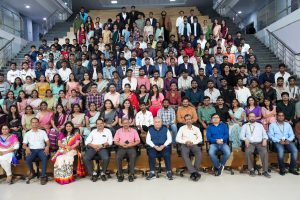 In a poignant and heartwarming event, The Directorate of Student Affairs at SRM University-AP bid adieu to its exceptional graduating batch of 2024. The farewell ceremony, held on the sprawling campus, was a celebration of achievements, camaraderie, and memories that will last a lifetime.
In a poignant and heartwarming event, The Directorate of Student Affairs at SRM University-AP bid adieu to its exceptional graduating batch of 2024. The farewell ceremony, held on the sprawling campus, was a celebration of achievements, camaraderie, and memories that will last a lifetime.
The event celebrated the students’ academic journey and was marked by touching speeches delivered by deans and faculty members. The farewell ceremony was far more than a simple farewell. It transcended the mere act of bidding adieu to the graduating batch of 2024. Instead, it was a tapestry of emotions, a celebration of achievements, and a poignant moment that will linger in the hearts of all who were part of it. It incorporated various forms of artistic expression, including musical and dance performances by the juniors that added a vibrant and lively atmosphere to the occasion. Additionally, the ramp walk showcased the style and panache of the graduating students, highlighting their unique personalities.
Throughout the event, students were presented with accolades for their outstanding academic performance and exemplary leadership. As the sun set on the farewell ceremony, the Class of 2024 could be seen looking towards the future with hope and excitement. They carry with them not just degrees but also a legacy of excellence, resilience, and strong bonds of camaraderie forged during their time at SRM University-AP.
SRM University-AP expressed immense pride in its graduating students, who have demonstrated exceptional dedication and commitment to their education. The institution eagerly anticipates the future achievements of the Class of 2024.
Congratulations are in order for these bright minds as they embark on new adventures and endeavours. Here’s to a successful and fulfilling journey ahead for the Class of 2024!
- Published in News, student affairs news
DEEPS Organised First Management Development Programme
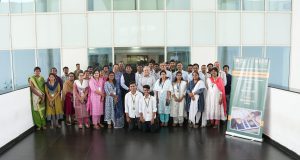 In a bid to empower working professionals and foster their continued growth, the Directorate of Executive Education and Professional Studies (DEEPS) at SRM University-AP organised a comprehensive 2-day Management Development Programme on “Selling Skills and Customer Relationship Management” in the presence of Vice Chancellor, SRM University-AP Prof. Manoj K Arora; Managing Director of Andhra Pradesh State Co-operative Bank, Dr R S Reddy; Dean-Academic Affairs, Dr Vinayak Kalluri; Dean-Paari School of Business & Director-DEEPS, Prof. Bharadhwaj Sivakumaran; and Assistant Director-DEEPS, Ms Sailaza Kosaraju. This programme was specially designed for the employees of the Andhra Pradesh State Co-operative Bank.
In a bid to empower working professionals and foster their continued growth, the Directorate of Executive Education and Professional Studies (DEEPS) at SRM University-AP organised a comprehensive 2-day Management Development Programme on “Selling Skills and Customer Relationship Management” in the presence of Vice Chancellor, SRM University-AP Prof. Manoj K Arora; Managing Director of Andhra Pradesh State Co-operative Bank, Dr R S Reddy; Dean-Academic Affairs, Dr Vinayak Kalluri; Dean-Paari School of Business & Director-DEEPS, Prof. Bharadhwaj Sivakumaran; and Assistant Director-DEEPS, Ms Sailaza Kosaraju. This programme was specially designed for the employees of the Andhra Pradesh State Co-operative Bank.
The MDP played a crucial role in honing customer relationship management among working professionals, thereby enhancing their knowledge, skills, and leadership capabilities. The industry-oriented faculty members of SRM AP trained the participants to unlock the employees’ full potential, promote leadership, and drive organisational success.
During the inauguration, Vice Chancellor Prof. Manoj K Arora emphasised the broader impact of the programme, stating, “In these two transformative days, you will immerse yourselves in a wealth of knowledge and practical insights that will revolutionise your approach to customer relationship management. Our esteemed faculty members will guide you through the intricacies of selling skills, empowering you to build lasting connections with customers and drive organisational success.”
Dr R S Reddy, shared his enthusiasm, stating, “I am filled with unwavering confidence that our employees will acquire the desired skills through this MDP. SRM AP has consistently demonstrated its commitment to excellence, and we eagerly anticipate forging stronger connections with this prestigious institution. Together, we will not only elevate the capabilities of our employees but also foster enduring partnerships that will shape the future of our organisations.”
Prof. Bharadhwaj Sivakumaran added, “Our goal is to bridge the gap between theoretical knowledge and practical application. MDPs like these will provide participants invaluable insights into customer relationship management and selling skills, which are crucial for their day-to-day operations.”
SRM University-AP is committed to organising more MDPs in an array of areas, including Business Analytics, HR, Finance, Operations Management, and technical areas like Cyber Security, A/IML, and Robotics, among others. The primary motive behind such training and workshops is to facilitate overall professional development among the participants.
The MDP will begin a transformational journey for the participating employees, which is expected to boost their career trajectory and contribute to the broader success of their organisation.
- Published in Departmental News, News, Paari Current Happenings
Innovative Wind Turbine System Patent Awarded to Dr Goutam Rana and Team
 In a significant advancement for sustainable energy technology, the Indian Patent Office Journal has officially granted a patent for the “Mini magnetically levitated wind turbine system for power generation.” This groundbreaking invention, bearing Application Number: 202241051560, is the brainchild of Dr Goutam Rana, Assistant Professor in the Department of Electronics and Communication Engineering.
In a significant advancement for sustainable energy technology, the Indian Patent Office Journal has officially granted a patent for the “Mini magnetically levitated wind turbine system for power generation.” This groundbreaking invention, bearing Application Number: 202241051560, is the brainchild of Dr Goutam Rana, Assistant Professor in the Department of Electronics and Communication Engineering.
Dr Rana, along with his dedicated team of B. Tech ECE students—Mr Vybagula Sai Vamsi, Mr Moparthi Teja, Mr Indrakanty Satwik, and Mr Pidikiti Venkata Abhinash have developed a system that promises to revolutionise how we harness wind energy. The turbine’s miniaturised and magnetically levitated design allows for efficient power generation with minimal mechanical friction, leading to a longer lifespan and reduced maintenance costs.
The team’s innovation aligns with global efforts to transition to renewable energy sources and showcases the potential of academic research in contributing to real-world challenges. The patent grant not only recognises the technical ingenuity of the invention but also underscores the collaborative spirit of the students and faculty at the institution.
Abstract:
Due to the increasing demand and supply gap, in the electrical energy system, wind energy is coming out as an alternative form of clean-with zero-carbon footprint renewable energy sources for power generation. The same is true for hydrocarbon-based fuels whose resources are limited and the contribution of vehicular pollution is also raising concerns in every-degrading the air quality index (AQI) of Indian cities. The electric and hybrid vehicles thus emerging fast as an alternative but often being hindered by the unavailability of proper charging infrastructures on roads.
The current invention is aimed to enable the use of wind turbines for harnessing wind energy and utilize the same to charge batteries of electrical vehicles or hybrid vehicles. The major challenges that have prevented the use so far are mainly two viz. low air flow and larger air drag. To address low airflow in normal road conditions in congested city alleys, we demonstrated the use of magnetically levitated Vertical-axis turbines instead of conventional ball-baring-based Horizontal-axis wind turbines. To reduce the air drag the use of vertical axis magnetically levitated wind turbines is a good option since the air drag experienced in the blade unit is not exactly in contact with the car body.
To improve on the drag further we have introduced an array of mini turbine units instead of one big unit which helps in distributing the total drag over a large area and since air can pass easily through small units overall drag experienced will be small. Also, to keep the levitation small, the rotating unit is made lighter with 3D printing perforated PLA material.
The rest of the operation of the system is similar to any wind turbine system i.e. with the help of permanent magnet and coil arrangement we will convert the wind energy (rotor movement) into electrical energy (e.m.f.). Only here instead of one single source, we will generate multiple small sources of induced electrical energy which can then be coupled together and used for charging the battery.
Since the invention uses magnetic levitation, friction is minimal. This helps the rotor to become independent of natural wind flow and use the movement of the vehicle to generate the required torque for the rotor movement. Our invention can be installed in the rooftop space of any vehicle and since it is divided into an array of smaller units, allows the optimum use of available space of the used vehicle. Overall cost and weight are also very minimal. Here, the most practical use case can be the widespread E-rickshaws in India. The choice of the use case is based on the fact of their large presence, longer run hours, and limited speed for the runs.
Explanation of the Invention in Layperson’s Terms:
The invention will act as a source of energy and can be used to charge batteries of electric vehicles or hybrid vehicles. The device converts wind energy to electrical energy through mini wind turbine arrays which can be placed on top of the rooftop of the vehicles. The rotor is kept suspended from the stator unit using magnets to eliminate friction. This helps to operate the device without the presence of strong natural wind, it utilizes the movement of the vehicle to generate the necessary rotation. The mini turbine arrays and magnetic suspension help to reduce the effect of wind drag (extra wind replaced by the turbine unit).
Practical Implementation or the Social Implications Associated
The invention is intended to solve a few on-road challenges of Electric Vehicles (EVs). The current invention is:
1. Low cost and one-time investment with zero maintenance charge for an EV
2. The proposed device can act as a secondary power source for the vehicle
3. The proposed device will convert wind energy, thus completely environment-friendly, and with comes with absolutely zero carbon footprint
4. The proposed device can add some extra mileage to the current battery storage as much as it runs.
5. With other renewable sources together a hybrid vehicle can be built which is free of fossil fuel completely.
Future Research Plans:
The current invention is in just proof of concept stage. We are currently working on the following
1. to improve the overall efficacy of the device such that each unit can harness wind energy to its optimal potential. With this, we will try to ensure that the battery gets charged completely (or at least a significant percentage) during each run during the day.
2. We are also working on the numerical study to calculate the actual wind drag with a more optimal design so that we can estimate how many units a certain vehicle will require and what should be the optimal placement scheme to utilize the maximum wind effect.
- Published in Departmental News, ECE NEWS, News, Research News
Groundbreaking Research on Optimal Routing Protocol in IEEE Sensors Journal
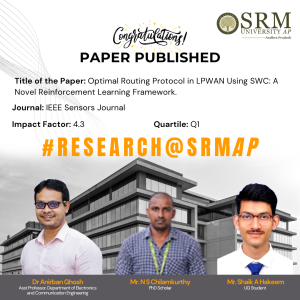 In a significant academic achievement, Dr Anirban Ghosh, Assistant Professor from the Department of Electronics and Communication Engineering along with Mr Naga Srinivasarao Chilamkurthy, PhD Scholar, and Mr Shaik Abdul Hakeem, an undergraduate student, have made a remarkable contribution to the field of communication engineering. Their paper, titled “Optimal Routing Protocol in LPWAN Using SWC: A Novel Reinforcement Learning Framework,” has been published in the esteemed IEEE Sensors Journal, with an impressive impact factor of 4.3.
In a significant academic achievement, Dr Anirban Ghosh, Assistant Professor from the Department of Electronics and Communication Engineering along with Mr Naga Srinivasarao Chilamkurthy, PhD Scholar, and Mr Shaik Abdul Hakeem, an undergraduate student, have made a remarkable contribution to the field of communication engineering. Their paper, titled “Optimal Routing Protocol in LPWAN Using SWC: A Novel Reinforcement Learning Framework,” has been published in the esteemed IEEE Sensors Journal, with an impressive impact factor of 4.3.
This publication marks a milestone for the university and highlights the innovative research being conducted by its faculty and students. The paper delves into the development of an optimal routing protocol for Low-Power Wide-Area Network (LPWAN) using State-Wise Communication (SWC), employing a novel reinforcement learning framework to enhance network efficiency and performance.
This work will pave the way for advancements in LPWAN technologies, which are crucial for the Internet of Things (IoT) ecosystem. The university community celebrates this achievement and looks forward to the positive impact it will have on technology and society.
Abstract:
Low Power Wide Area Network (LPWAN) has emerged as a dominating communication technology that offers low-power and wide coverage for the Internet of Things (IoT) applications. However, the direct data transmission approach has a limited network lifetime. Even multi-hop data transmission experiences several difficulties including high data latency, poor bandwidth utilization, and reduced data throughput. To overcome these challenges, in this paper, a recent breakthrough in social networks known as Small-World Characteristics (SWC) is incorporated into LPWANs.
In particular, in this work, Small-World LPWANs (SW-LPWANs) are developed by using the Reinforcement Learning (RL) technique and using different node centrality measures like degree, betweenness, and closeness centrality. Further, the performance of the developed SW-LPWANs is evaluated in terms of energy efficiency (alive/dead devices, and network residual energy) and Quality-of-Service (average data latency, data throughput, and bandwidth utilization), and is compared with that of conventional multi-hop LPWAN. Finally, to validate the simulation results, similar analyses are performed on the real-field LPWAN testbed.
The obtained simulation results confirm that SW-LPWAN developed by the RL method performs better than other techniques, with 11% more alive devices, 5.5% higher residual energy, 2.4% improved data throughput, and 14% efficient bandwidth utilization compared to the next best method. A similar trend is observed with real-field LPWAN testbed data also.
Explanation of the Research in Layperson’s Terms
Social networks primarily revolve around establishing human connections, whereas LPWANs are designed for connecting IoT devices that have limited battery-driven power. In this context, the smart devices must communicate in an IoT setting to conserve the limited energy available to them. To achieve this, the concept at the core of social networking also known as small world characteristic is incorporated into LPWAN using the Q-learning technique.
Practical Implementation or the Social Implications of the Research
IoT applications such as remote healthcare, smart environmental monitoring, asset tracking, and smart traffic systems require low transmission delay and high network lifetime. The proposed research helps in achieving the above parameters.
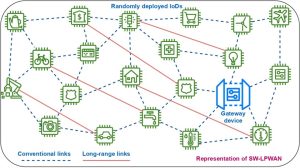
Collaborations
Dr Om Jee Pandey, Assistant professor Department of Electronics Engineering, Indian Institute of Technology, (BHU), Varanasi. e-mail: omjee.ece@iitbhu.ac.in
Dr Linga Reddy Cenkeramaddi, Professor, Department of Information and Communication Technology, University of Agder, Norway. e-mail:linga.cenkeramaddi@uia.no
Future Research Plan
In the next phase of research, we will be interested in investigating how the energy efficiency and other quality of service of smart devices in an IoT setting can be improved if they are partially or completely mobile.
- Published in Departmental News, ECE NEWS, News, Research News
Unlocking Cholesterol Homeostasis: A Mathematical Modelling Perspective
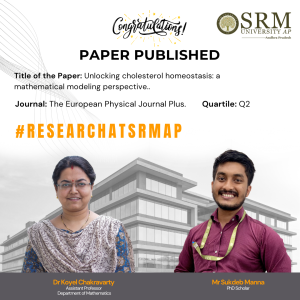 In a significant stride towards understanding cholesterol homeostasis, Dr Koyel Chakravarty, Assistant Professor and Mr Sukdeb Manna, a PhD Scholar in the Department of Mathematics has co-authored a paper titled “Unlocking Cholesterol Homeostasis: A Mathematical Modelling Perspective.” The paper has been published in the esteemed journal, The European Physical Journal Plus, with an impact factor of 3.4. This collaborative effort showcases the innovative application of mathematical modelling in unravelling the complexities of cholesterol regulation within the body.
In a significant stride towards understanding cholesterol homeostasis, Dr Koyel Chakravarty, Assistant Professor and Mr Sukdeb Manna, a PhD Scholar in the Department of Mathematics has co-authored a paper titled “Unlocking Cholesterol Homeostasis: A Mathematical Modelling Perspective.” The paper has been published in the esteemed journal, The European Physical Journal Plus, with an impact factor of 3.4. This collaborative effort showcases the innovative application of mathematical modelling in unravelling the complexities of cholesterol regulation within the body.
The research not only contributes to the existing body of knowledge in this field but also sheds light on potential avenues for further exploration and understanding. Dr Chakravarty and Mr. Manna’s work underscores the importance of interdisciplinary approaches in scientific research and highlights SRM University-AP’s commitment to fostering cutting-edge research and innovation.
Their collaborative efforts serve as an inspiration to aspiring researchers and underscore the university’s dedication to pushing the boundaries of knowledge and discovery. Congratulations to Dr Chakravarty and Mr Manna on this remarkable achievement, and we look forward to more groundbreaking contributions from them in the future.
Abstract:
Limited progress in the mathematical modelling of cholesterol transport systems is hampering novel therapeutic interventions. This issue is addressed by the present study through precise design, employing four compartmental models to elucidate cholesterol dynamics in the comprehensive bloodstream. Disparities in medical advancements, particularly in cholesterol-related pathophysiology, are aimed to be bridged, advancing medical science and patient care outcomes.
Therapeutic strategies for reducing blood cholesterol are explored by the model, with parameter influences on equilibrium stability revealed through sensitivity analysis. System parameters are effectively manipulated by imposing sensitivity analysis, and pinpointing areas for model refinement. Stability analysis contributes to diverse realistic models, confirming local asymptotic stability. Model efficacy in studying cholesterol transport dynamics is supported by analytical and numerical assessments. The study concludes with the present model validation to substantiate it by comparing the present outcomes with the existing ones.
Explanation of The Research in Layperson’s Terms:
Basically, scientists are having trouble figuring out how to model how cholesterol moves around in the body, which is important for developing new treatments. This study tries to solve that problem by creating detailed models that show how cholesterol behaves in different parts of the bloodstream. The goal is to bridge the gap in medical knowledge about cholesterol-related problems and improve how we treat patients. The models help us understand how different treatments might affect cholesterol levels, and by analyzing them closely, we can figure out which factors are most important. This lets us tweak the models to make them more accurate. The study shows that the models are reliable by testing them both analytically and numerically, and comparing the results to what we already know.
Practical Implementation or the Social Implications of the Research
1. Personalized Medicine: The mathematical models developed in this research could help in designing personalized treatment plans for individuals with high cholesterol levels. By understanding how different factors affect cholesterol dynamics, doctors can tailor therapies to each patient’s specific needs, leading to more effective and targeted treatments.
2. Drug Development: Pharmaceutical companies could use these models to screen potential drugs for lowering cholesterol. By simulating how different compounds interact with cholesterol transport systems, researchers can identify promising candidates for further testing, potentially speeding up the drug development process.
3. Healthcare Cost Reduction: Better understanding of cholesterol dynamics could lead to more efficient use of healthcare resources. By optimizing treatment strategies and preventing complications related to high cholesterol, healthcare costs associated with conditions like heart disease could be reduced, benefiting both individuals and society.
4. Public Health Initiatives: Insights from the research could inform public health initiatives aimed at reducing cholesterol-related diseases. For example, policymakers could use the models to design targeted interventions such as education campaigns promoting healthy lifestyle choices or policies to improve access to cholesterol-lowering medications.
5. Improved Patient Outcomes: Ultimately, the goal of this research is to improve patient outcomes by better understanding and managing cholesterol homeostasis. By developing more accurate models of cholesterol transport dynamics, healthcare providers can make more informed decisions, leading to better control of cholesterol levels and reduced risk of cardiovascular disease and other related conditions.
Future Research Plans:
1. Current models may focus on a limited set of factors influencing cholesterol transport. Future research could explore the integration of additional biological factors such as genetic variations, hormonal influences, and dietary components into the models to create a more comprehensive understanding of cholesterol homeostasis.
2. Most existing models of cholesterol transport assume static conditions. Future research could develop dynamic models that capture the time-dependent changes in cholesterol levels in response to various stimuli, such as meals, physical activity, and medication intake. Dynamic models would provide a more accurate representation of real-world cholesterol dynamics and enable the evaluation of time-sensitive interventions.
Picture Related to the Research
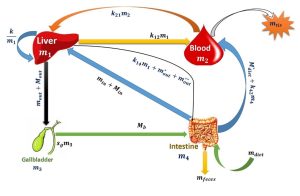
- Published in Departmental News, Math News, News, Research News
Film Gala 2024: A Spectacular Showcase of Talent and Creativity
 On April 24-25, 2024, the much-anticipated Film Gala 2024 unfolded by SRM University-AP’s Cinemates Club, under the Directorate of Student Affairs, igniting the creative fervour of budding filmmakers from universities across India. This exhilarating event provided a vibrant platform for these talented individuals, budding to exhibit their cinematic prowess.
On April 24-25, 2024, the much-anticipated Film Gala 2024 unfolded by SRM University-AP’s Cinemates Club, under the Directorate of Student Affairs, igniting the creative fervour of budding filmmakers from universities across India. This exhilarating event provided a vibrant platform for these talented individuals, budding to exhibit their cinematic prowess.
Graced by the presence of esteemed Tollywood actor Satya Dev and actress Archana as chief guests, the event was a star-studded affair filled with entertainment and enlightenment. Attendees were treated to mesmerizing dance performances, soulful music, engaging discussions, pulsating DJ sets, and a celebration of artistic brilliance that left everyone inspired.
The atmosphere at the Gala was electric, as aspiring filmmakers seized the opportunity to have their talents acknowledged and applauded. The Film Gala hosted an array of thrilling competitions, each pushing the boundaries of creativity:
- Cineverse: Where Stories Unfold: A short film competition that transported audiences through captivating narratives.
- Snake and Ladders: A playful twist on storytelling where every move leads to unexpected turns.
- Plot Saga: Your Journey With Scripts: A celebration of the art of scriptwriting, where imagination knew no bounds.
- Trailer Trek: Filmmakers raced against the clock, crafting gripping trailers that left viewers craving more.
- Cinerythm: Western dance took centre stage, with both group and solo performances.
- Character Canvas: Participants embodied iconic movie characters, showcasing their versatility.
- Galasymphony: The spotlight shifted to melodious voices in a spirited singing competition.
- Visual Fable: Every frame held a story, as participants created videos based on a central theme.
- Movie Night: A cinematic feast under the stars, where films came alive on the big screen.
- Cinematography Workshop: Aspiring cinematographers honed their skills, learning from industry experts.
The Film Gala was more than an event; it was a celebration of artistic brilliance. Aspiring filmmakers seized the opportunity to have their work recognized and appreciated. Their passion and dedication illuminated every corner of the venue, leaving an indelible mark on the cinematic landscape. Congratulations to the organisers, participants, students and everyone who contributed to making the Film Gala 2024 an unforgettable success!
- Published in News, student affairs news
Dr Manjula R and Students Publish Book Chapter on Machine Learning in 6G Networks
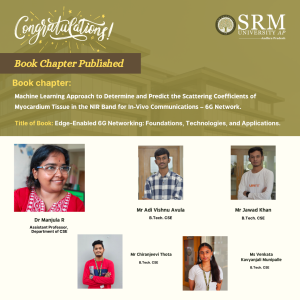 In an exciting development, Dr Manjula R, Assistant Professor in the Department of Computer Science and Engineering, along with B.Tech. students Mr Adi Vishnu Avula, Mr Jawad Khan, Mr Chiranjeevi Thota, and Ms Venkata Kavyanjali Munipalle, have authored a book chapter titled “Machine Learning Approach to Determine and Predict the Scattering Coefficients of Myocardium Tissue in the NIR Band for In-Vivo Communications – 6G Network in book name “Edge-Enabled 6G Networking: Foundations, Technologies, and Applications”.
In an exciting development, Dr Manjula R, Assistant Professor in the Department of Computer Science and Engineering, along with B.Tech. students Mr Adi Vishnu Avula, Mr Jawad Khan, Mr Chiranjeevi Thota, and Ms Venkata Kavyanjali Munipalle, have authored a book chapter titled “Machine Learning Approach to Determine and Predict the Scattering Coefficients of Myocardium Tissue in the NIR Band for In-Vivo Communications – 6G Network in book name “Edge-Enabled 6G Networking: Foundations, Technologies, and Applications”.
This achievement highlights the innovative research and collaboration showcase the dedication and expertise of both faculty and students in the field of computer science and engineering. The book chapter explores the cutting-edge advancements in 6G networking and its potential applications, shedding light on the future of communication technologies.
We congratulate Dr Manjula R and the team of talented students on this significant accomplishment and look forward to seeing more groundbreaking research from them in the future. Stay tuned for more updates on their work and achievements.
Abstract
The accurate calculation of the scattering coefficient of biological tissues (myocardium) is critical for estimating the path losses in prospective 6-G in-vivo Wireless Nano sensor networks (i-WNSN). This research explores machine learning’s potential to promote non-invasive procedures and improve in-vivo diagnostic system’s accuracy while determining myocardium’s scattering properties in the Near Infrared (NIR) frequency. We begin by presenting the theoretical model used to estimate and calculate scattering coefficients in the NIR region of the EM spectrum. We then provide numerical simulation results using the scattering coefficient model, followed by machine learning models such as Linear Regression, Polynomial Regression, Gradient Boost and ANN (Artificial Neural Network) to estimate the scattering coefficients in the wavelength range 600-900 nm.
We next contrast the values provided by the analytical model with those predicted via machine learning models. In addition, we also investigate the potential of machine learning models in producing new data sets using data expansion techniques to forecast the scattering coefficient values of the unavailable data sets. Our inference is that machine learning models are able to estimate the scattering coefficients with very high accuracy with gradient boosting performing better than other three models. However, when it comes to the prediction of the extrapolated data, ANN is performing better than other three models.
Keywords: 6G, In-vivo, Dielectric Constant, Nano Networks, Scattering Coefficient, Machine Learning.
Significance of Book Chapter
The human heart is a vital organ of the cardiovascular system and is very crucial for any living being. However, this organ is prone to several diseases—Cardiovascular Disease (CVD)—an umbrella term. CVDs are the set of the heart diseases that comprises heart attack, cardiac arrest, arrhythmias, cardiomyopathy, atherosclerosis to name a few. CVD alone account for most of the deaths across the globe and is estimated reach 23.3 million deaths due to CVD by 2030. Early detection and diagnosis of CVD is the ultimate solution to mitigate these death rates. Current diagnostic tests include, however not the exhaustive list, ECG, blood test, cardiac x-ray, angiogram.
The limitations of these techniques include bulkiness of the equipment, cost, tests are suggested only when things are in critical stage. To alleviate these issues, we are now blessed with on-body or wearable devices such as smart watches that collect timely information about the cardiac health parameters and notify the user in a real-time. However, these smart watches do not have the capability to directly detect the presence of plaque in the arteries that leads to atherosclerosis. These devices have the capability to track certain health parameters such as heart rate, blood pressure, other activity levels, any deviation in the measured values of these parameters from the normal values might give an indication of cardiac health issues. This requires a formal diagnostics test such as cardiac catheterization or cardiac x-ray leading to the original problem.
Therefore, in this work we aim to mitigate these issues by proposing the usage of prospective medical grade nanorobots—called nanosurgeons, that can provide real-time live information on the health condition of the internal body. Particularly, our work assumes that these tiny nanobots are injected into the cardiovascular system that keep circulating along with the blood to gather health information. Such nanosized robots are typically expected to work in the terahertz band owing to their size. At such high frequency, the terahertz signals are prone to high path losses due to spreading, absorption and scattering of the signal during propagation. Our work aims at understanding these losses, especially the scattering losses, of the terahertz signal in the NIR band (600-900 nm) using the existing models, analytically. Further, to understand the strength of machine learning in predicting these scattering losses, we also carryout simulation work to estimate and predict the scattering losses using Linear Regression, Polynomial Regression, Gradient Boost and Artificial Neural Network (ANN) models.
Our preliminary investigation suggests scattering losses are minimal in NIR band and machine learning can be seen as a potential candidate for perdiction of scattering losses using the available experimental data as well as using data augmentation techniques to predict the scattering losses at those frequencies for which either experimental data is not available or can prevent the use of costly equipment to determine these parameters.
- Published in Computer Science News, CSE NEWS, Departmental News, News, Research News
Easwari School of Liberal Arts Facilitates Transformative Academia-Social Sector Dialogue
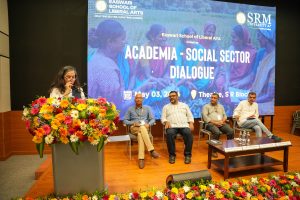 The Easwari School of Liberal Arts hosted the highly anticipated “Academia-Social Sector Dialogue” event, aiming to foster collaboration between academia and the social sector. The event brought together experts, social actors, scholars, practitioners, and students to engage in insightful discussions about the intersection of education and social sector development.
The Easwari School of Liberal Arts hosted the highly anticipated “Academia-Social Sector Dialogue” event, aiming to foster collaboration between academia and the social sector. The event brought together experts, social actors, scholars, practitioners, and students to engage in insightful discussions about the intersection of education and social sector development.
The event, convened by Prof. Vandana Swami, brought together a distinguished array of social sector leaders, Academicians from various states across India, deans, faculties, and students. It was a day of enlightening discussions and knowledge exchange, aiming to bridge the gap between academia and the social sector.
At the heart of this dialogue was a commitment to nurturing well-rounded, socially conscious leaders of tomorrow. The event provided a platform for students to engage directly with eminent figures from the social sector, fostering a deeper understanding of real-world challenges and opportunities.
The dialogue saw participation from leading social actors, including Liby Johnson (Gram Vikas, Odisha), Ronak Shah (Seva Mandir, Udaipur), Nishant Aggarwal (Donyi Polo Cultural and Charitable Trust, Arunachal Pradesh), Swapna Sarangi (Foundation for Ecological Security, Odisha), Gayatri Menon (Independent Researcher, Public Health Foundation of India, Bengaluru and Academic luminaries, such as Suraj Jacob (Azim Premji University, Bengaluru) and Manu Mathai (World Resources Institute, Bengaluru) Yamini Aiyar, Former President, Center for Policy Research, New Delhi, added depth to the dialogue, offering nuanced perspectives on the intersection of academia and the social sector.
Prof. Vishnupad, Dean of Easwari School of Liberal Arts, expressed his satisfaction with the event’s outcomes, stating, “We are delighted to have facilitated this enriching exchange between academia and the social sector. The discussions were not only insightful but also generative, paving the way for potential future collaborations between students and social sector organisations that can bring about positive change in the society.”
A highlight of the event was the keynote speech by Amitabh Behar, Global Executive Director of OXFAM. Behar’s insights sparked discussions among attendees, leading to reflection and action-oriented dialogue on caste, gender, and economic inequality. This prompted introspection and dialogue on the responsibilities of civil society in addressing these urgent issues.
The event featured thought-provoking panel discussions on two key themes: “Social Sector and the Indian State: Challenges and Opportunities” and “Role of Social Sector in Liberal Arts Education.” Panellists deliberated on the complexities and possibilities within the social sector, exploring ways to address challenges and leverage opportunities for societal progress. The dialogue was not only engaging but also fruitful, laying the groundwork for potential collaborative efforts in the future.
Furthermore, discussions on the Easwari School of Liberal Arts Summer Immersion Programme underscored the institution’s commitment to experiential learning and social impact.
Prof. Vandana Swami, Professor, Easwari School of Liberal Arts remarked, “Academia-Social Sector Dialogue epitomises SRM University-AP’s ethos of excellence, innovation, and social responsibility. It serves as a testament to the university’s unwavering dedication to shaping future leaders who are not only academically proficient but also socially conscious and empathetic global citizens”.
- Published in Departmental News, History Current Happenings, Liberal Arts News, Media Studies, News


